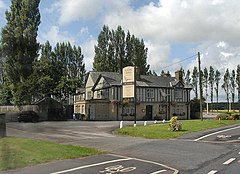Eccleston, St Helens
| Eccleston | |
|---|---|
 The Game Bird public house, Eccleston |
|
| Eccleston shown within Merseyside | |
| Population | 10,433 (2011 Census) |
| OS grid reference | SJ485955 |
| Civil parish |
|
| Metropolitan borough | |
| Metropolitan county | |
| Region | |
| Country | England |
| Sovereign state | United Kingdom |
| Post town | ST. HELENS |
| Postcode district | WA10 |
| Post town | PRESCOT |
| Postcode district | L34 |
| Dialling code | 01744 |
| Police | Merseyside |
| Fire | Merseyside |
| Ambulance | North West |
| EU Parliament | North West England |
| UK Parliament | |
| Website | www |
Eccleston is a civil parish within the Metropolitan Borough of St Helens, Merseyside, England. According to the 2001 Census it had a population of 10,528, falling to 10,433 at the 2011 Census.
Historically a part of Lancashire, the early history of Eccleston is marked by its status as a township, an area much larger than the modern civil parish, extending into what is now St Helens. Part of the township was united with Parr, Sutton and part of Windle to form the Municipal Borough of St Helens in 1868.
Eccleston is one of seven civil parishes in St Helens, and one of the largest covering the neighbourhoods of Eccleston Park, Gillars Green, Trapwood Close, and the area around Springfield (now a Carmelite monastery) south of the A580 road.
Eccleston means church farm or settlement. Eccles which is found in several place names in the North West of England is derived from the Welsh Eglwys and the use of this word implies a Celtic religious foundation. However, there does not seem to have been a church in the township of Eccleston until Portico Our Lady's Roman Catholic chapel in the late 18th century. St Thomas, Eccleston (now on Westfield Street, St Helens town centre) and Christ Church date from 1838/39. It is suggested that the name is connected with the adjoining town of Prescot which has had a church for over a thousand years. The present Eccleston Hall dates from the 1820s but there have been halls on the site from the late mediaeval period. The Eccleston family, who were Lords of the Manor of Eccleston, were recusants and there was a Catholic chapel in the old hall which was built in the Tudor era.
...
Wikipedia

